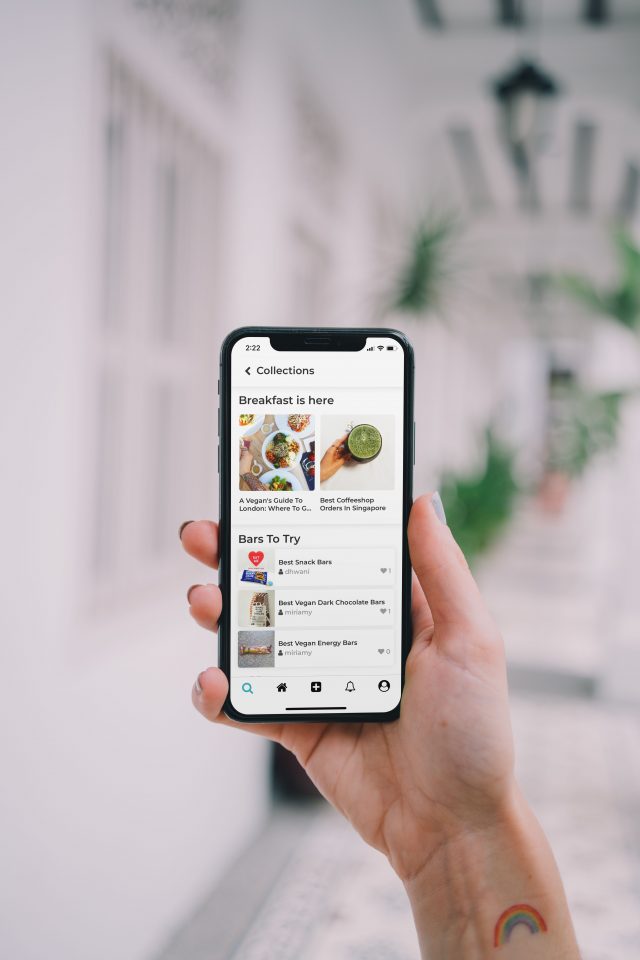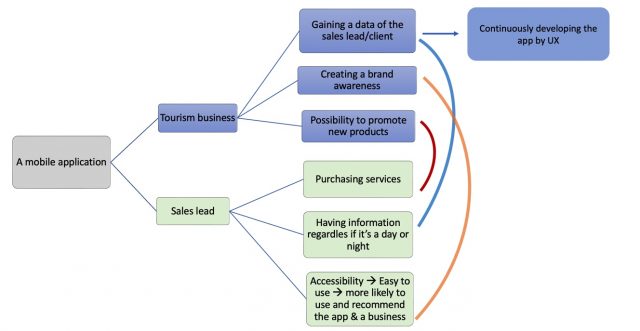How can mobile app boost your tourism business to success?

Picture from Unsplash.com
Did you know travel applications are the seventh most popular category of most downloaded apps and over 60 percent of travelers choose to use mobile apps while traveling?¹ In the future, there will be thousands of new mobile applications with new facilities that offer travelers daily movement without the assistance of humans while traveling. Therefore, it is important for the tourism industry and mobile technology developers to improve or create a mobile application that understands the landscape of mobile applications in the market and sees what is absent.² After reading this blog post, you should gain more information about mobile apps and how can they benefit the tourism industry.
Mobile Apps in a nutshell
In 2019 there were over 3 billion mobile app users and it has been studied that the average mobile app user spends proximately 3,7 hours a day in applications. Mobile applications have been designed for smartphones and tablets for micro-problems that the app designer has identified, and the app’s purpose is to come up with a solution. ³ Currently, there are two major App stores that are designed for specific devices: Apple Store (for iOs devices, iPhones, iPads) and Google Play Store (for Samsung, Huawei, Xiaomi). There are mobile apps that are free to download and apps with a fee. The mobile app’s idea is to be an easy and quick way to use and it can be downloaded whenever you want or where ever you are. In addition, mobile apps are designed for several purposes: To offer entertainment, gaming, helping users in everyday life tasks (E.g., counting calories, budgeting, food delivery, etc), social media (Facebook, Instagram, etc), seeking company, finding a transfer and sending messages or video calls. ³ The app’s purpose can be educational, ideal for business, or for a daily lifestyle.
A mobile app can also consist of help in augmented reality (AR) or virtual reality (VR). Mobile AR technology has developed nowadays greatly and travelers can access tourist resources for their travel choices directly by using smartphones.⁴
The behavior of tourism apps users
It is clear as of the day that a successful mobile app is an app that benefits the user. By understanding the user’s behavior as well as motives and needs it is possible to create an app that is useful for the user. Moreover, external and internal motivations, cognitive beliefs, contextual promotion, and tourists’ past experience of smartphones during a trip and experience of smartphones affect tourists’ acceptance and apprehension of mobile apps.⁴
I found out that research shows that mobile AR apps have an important role in tourist behavioral intentions in making unexpected purchases. Notably, as the utility, user-friendly, and interactivity of the apps increase, the perceived enjoyment, and satisfaction of the user increase and give rise to a stronger impulse buying behavior. In addition, many researchers have noted that the role of AR in mobile apps has affected tourist intention to visit a particular destination.⁵
According to research done by Google, over 70 % of leisure travelers have downloaded or used travel applications during their trips and over 60 percent of business travelers use the application for reservations. More than half think applications are convenient, and over 40 percent think it’s easier to book through the application than a mobile browser: Intention to more frequently search for information from the brand, having a bonus point, and using loyalty systems. Friends, family, or colleagues acting as recommenders such as reviews and recommendations in app stores. In addition, consumers think that a poorly designed mobile app drives potential customers to competitors and it affects negatively the brand image. ⁶ To summarize this chapter, smartphones are used throughout the travel process, including for inspiration during the trip for buying activities or ancillary services. Almost half of those who use their smartphone for leisure travel inspiration ultimately book through another method. ⁶

Picture from Unsplash.com
Benefits of Mobile Apps
For many tourism businesses, mobile apps are very important tools to help customers quickly search for specific information or make quick reservations. According to previous research, mobile devices have the plausible to have an enormous effect on the tourism business. The key elements in the development of mobile applications must be taken into consideration. The key elements are, costs, opportunities to operate on a wider range of devices, and accounting for the specific needs of users. Mobile applications not only serve the purpose of being smart and fast but to overcome the dependency on human work and reduce costs. ³
Travelers prefer mobile apps over websites since there are many benefits mobile apps can offer. Mobile devices offer for tourist do last-minute purchases which are used in all phases of the tourist service process, from a destination survey and online booking to post-travel suggestions and reviews. In addition, travel agencies see efforts and invest money in mobile apps which put wise to that service providers surely see benefits in the mobile apps.7 Here are listed some of the top advantages of mobile apps:
– Purchasing services: Flight tickets, ancillary services, accommodations
– Accessibility & having information at any time of the day, even without wifi connection
– Tourism mobile application improves and shows the best available trip packages for the destination. Users can get details from the destination and view the itinerary.
-Travel apps assist in planning the trip, routes, and travel guides give precise information about various famous and even lesser known
– The app can be a travel guide and even a map to take the traveler to the destination
-Usage of simple tags such as Quick Response codes, that can greatly enrich the tourist experience at a destination.
-AR technology in destinations is a fun and immersive way to learn more about the destinations
As a result, tourists can have an immersive, more favorable, and gain richer experience. Mobile apps have a positive impact on the tourism business: Gaining new leads, service quality and competitiveness, providing information, encouraging customers to use your services, brand awareness, the possibility to promote new products, and the chance to gather customer data.7
Tips to design a successful mobile app
Van Baker, vice president at Gartner, states that effective app development requires businesses to rethink business processes and a mobile employee works to take advantage of the benefits that technology offers. When designing a mobile app that improves business productivity with a real return on investment and satisfies user needs. ⁸ You must take into account three elements:
- User experience (UX) – means how someone feels when interacting with an app, well designed UX takes into account user attitudes and behaviors and it compasses under the control of a developer or designer. An easy and clear user interface (UI) is also important to take into consideration in context.⁸
- Architecture— Proper architecture in a mobile app is critical to designing successful mobile apps that positively impact the business and facilitate the rapid development of apps that work with existing record systems. They incorporate services that improve the mobile app’s functions.⁸
- Business process – By changing and extending the current offers in the tourism business process it can create an impactful mobile app. This can be done by adding new abilities to the business concept.⁸
The quality characteristics that affect mobile applications quality are: portability (if an application has a tendency to run on multiple platforms or not), extensibility, and adaptability as applications adapt to changes from their environment like adaptability in input methods and different orientations of handheld devices, efficiency, maintainability, usability (user-friendly), and data integrity.¹¹ Forbes’s research on mobile apps states that mobile all should be simple and ensure that users can use the app with the fewest possible taps and swipes, use chatbots, and promoting the app on social media and optimize app store content and elicit user reviews. You should also spread awareness of the mobile apps through ads, encouraging downloads via SMS and email offers, and adding the app download QR code to your website homepage. 9
Recognizing your target demographic is important when designing an app since different individuals have their own unique habits when it comes to smartphones. Understanding the needs of different generations, you can design an app that serves many users.¹⁰ When creating an application, you must also think about if your target group is iOS users or Android users and whether AR technology would benefit the users.
Conclusion & suggestions
To summarize this blog post, mobile apps are highly appreciated and their usage is continuously rising. A well-designed mobile application serves the user and creates value for the user as well as for the tourism business. There are many different types of mobile applications with different purposes. I brought up here three of the most important benefits that mobile applications serve for tourism businesses, sales leads, or clients. To put the most important components in one figure, I create this module to understand clearly the whole context more. Blue boxes describe the benefits for tourism businesses and green boxes describe the benefits for the customers or sales leads that mobile apps offers.

Source: Author
Businesses can gain data on their customer’s paths in a mobile app, the business can improve its UX when they gather more data about the client’s path in the application. To improve the mobile application in tourism businesses, industries could have surveys in the application that the customer could answer and earn rewards. By using surveys they could lead the app user to different platforms in the app and after visiting all platforms, the customer could give reviews about the app. Regularly reading online reviews from app users will help firms prioritize features that matter to users by gaining data about clients’ needs, motives, and UX by an improve mobile applications all the time to meet the needs and expectations of the customer or potential leads.¹²
In addition, there are many travelers who have a disability or they are oldster, I could suggest that the mobile app designers could concentrate the mobile app marketing for older people to reach out to them. By marketing mobile apps as user-friendly they could also target older users. Perhaps, marketers could market mobile apps by marketing how simple it is to implement and use. Another suggestion is that the mobile app could speak and direct the user to use the app’s features since older travelers can have impaired vision. In this way, tourism businesses could have more value for the app.
Every new step that tourism industries take to develop mobile applications to meet customer needs, is a win for the company and key to success. As earlier mentioned, mobile apps can reduce human work and thus generate savings, create brand awareness and competitive advantage, and many other advantages. These advantages are all very important aspects to head up for success.
References
¹GoodWorks Labs. 2015. How mobile app benefits travel and tourism industry. https://www.goodworklabs.com/how-mobile-app-benefits-travel-and-tourism-industry/
²Roswati Abdul Rashid et al 2020 J. Mobile Apps in Tourism Communication: The Strengths and Weaknesses on Tourism Trips. https://www.researchgate.net/publication/254250344_Tourism_and_the_Smartphone_App_Capabilities_Emerging_Practice_and_Scope_in_the_Travel_Domain
³Lupton, D. 2020. The Sociology of Mobile Apps. https://www.researchgate.net/publication/341568463_The_Sociology_of_Mobile_Apps
9. Rao, A. 2021. Seven Ways To Create A Successful Mobile App Strategy.https://www.forbes.com/sites/forbescommunicationscouncil/2021/02/17/seven-ways-to-create-a-successful-mobile-app-strategy/?sh=5b95308e5279
- How can mobile app boost your tourism business to success? - November 20, 2022